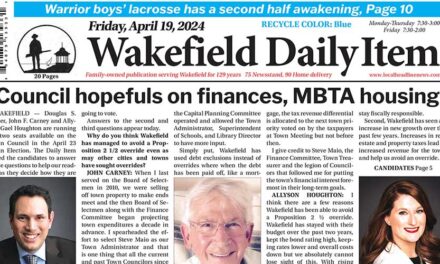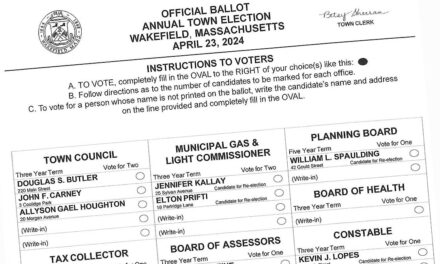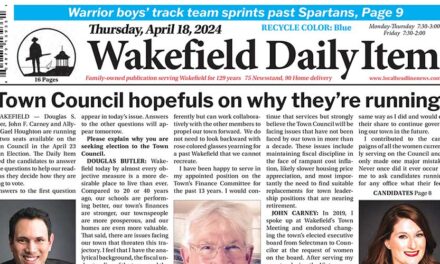Published in the September 12, 2017 edition.
WAKEFIELD — All selectmen taking part in last night’s meeting backed changing their board’s name, a decision that now heads to the November 6 Town Meeting and if approved there, to the April election ballot.
The majority — Ed Dombroski, Ann Santos, Mehreen Butt and Paul DiNocco — voted that the name be changed to “town council” in the warrant article the board will sponsor at Town Meeting. Peter May and Tony Longo supported “board of directors.” Brian Falvey was absent.
Because the board’s new name would require a change to the Town Charter, two thirds of those voting at the November Town Meeting would need to approve. Then town voters would get a shot at the proposal in April.
The debate over whether to change Board of Selectmen to some gender neutral name began in June. At the time, Town Administrator Town Administrator Stephen P. Maio noted that “selectman” is the only municipal office that is specific by gender. About 30 communities in Massachusetts have made the change to something not gender-specific, like “selectboard,” Maio said. Any change in Wakefield would require a change to the Town Charter, Maio said.
A Charter Review Committee is currently reviewing the Town Charter for possible change recommendations.
Longo asked if there was any way that the town could vote on it. Town Counsel Thomas Mullen said that any changes to the Charter would have be approved by a two-thirds Town Meeting vote and then go before the voters in an election.
Santos said that she wanted to make it clear that the impetus for the discussion did not come from her or the other woman currently on the board, Mehreen Butt.
Santos said that she has always referred to herself as a “selectman,” but admitted that at times it felt a little awkward. She agreed that it made sense to consider changing the name, since it is the only one that is gender-specific.
In response to a question regarding the process from Dombroski, Mullen elaborated that there are actually two ways to amend the Charter: the aforementioned two-thirds Town Meeting vote followed by an election; or Town Meeting could vote by simple majority to petition the state Legislature to change the Charter, which would still come back to a vote at a local election.
Butt wanted to know why changing the name of the board with the only gender specific name had to be voted on town-wide.
Mullen explained that that was the legal way to change the Charter.
“If you’re going to change the Charter,” Mullen said, “that is how you do it.” He added that if the board wanted to informally and unofficially call itself by another name, it was free to do so. However, if they wanted the change to appear on official documents, etc., a Charter Change would be required.
Butt noted that the Charter Review Committee is not planning to bring recommendations to Town Meeting until the fall of 2018, and wanted to know what the board could do in the meantime outside the Charter.
May pointed out that the term “selectman” has been around since the 1600s, and observed that the word “woman” also contains ‘man.’”
Dombroski said that he didn’t think the current members of the board should be making the call on changing the name.
“The people of the town should,” he said back in June. “We are just here temporarily. We are not in a position to rename ourselves.”




